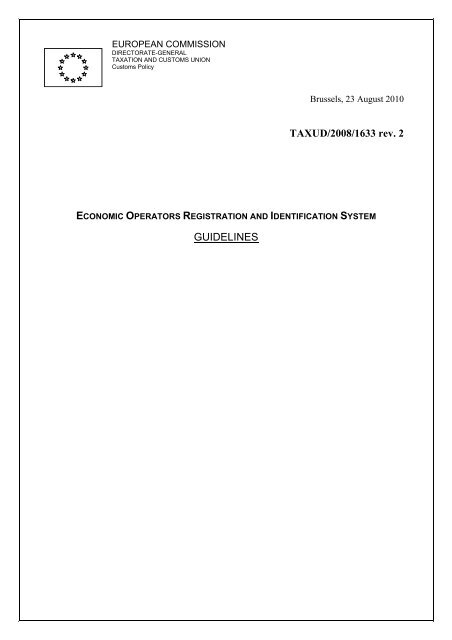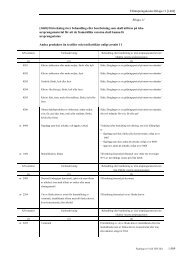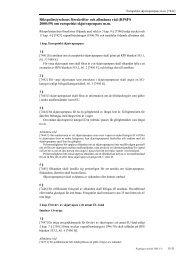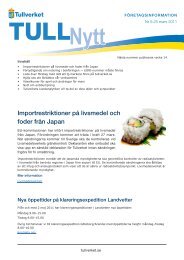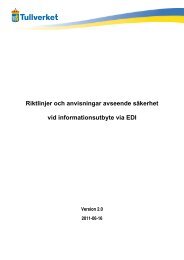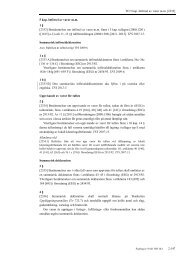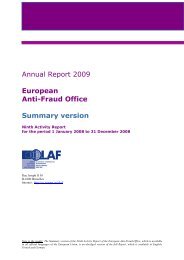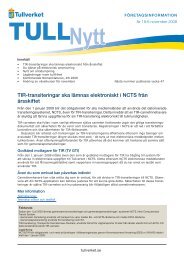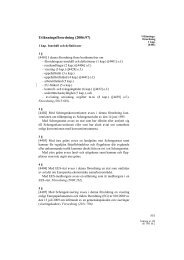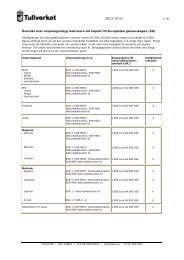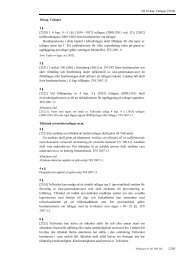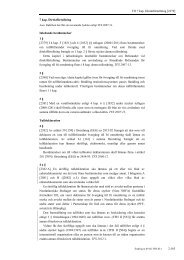EORI Guidelines - European Commission - Europa
EORI Guidelines - European Commission - Europa
EORI Guidelines - European Commission - Europa
You also want an ePaper? Increase the reach of your titles
YUMPU automatically turns print PDFs into web optimized ePapers that Google loves.
EUROPEAN COMMISSIONDIRECTORATE-GENERALTAXATION AND CUSTOMS UNIONCustoms PolicyBrussels, 23 August 2010TAXUD/2008/1633 rev. 2ECONOMIC OPERATORS REGISTRATION AND IDENTIFICATION SYSTEMGUIDELINES
LEGAL NOTICEThis document contains guidelines explaining the <strong>EORI</strong> obligations and how to fulfil them. However,users are reminded that the Customs Code and the Customs Code Implementing Provisions are the onlyauthentic legal basis and that the information in this document should not be considered legal advice.2
TABLE OF CONTENTSIntroduction..................................................................................................................................................................... 4Abbreviations.................................................................................................................................................................. 51. REGISTRATION...........................................................................................................61.1. Who will have to be registered for an <strong>EORI</strong> number?............................................................................ 61.1.1. Economic operators established in the customs territory of the Community ....................................................... 61.1.2. Economic operators not established in the customs territory of the Community ................................................. 71.1.3. Persons other than economic operators ................................................................................................................ 81.1.4. Third country diplomatic missions, international organisations and non-governmental organisations…........... .81.2. Authorities responsible for the <strong>EORI</strong> registration .................................................................................. 81.3. Place of registration........................................................................................................................................ 91.3.1. Economic operators established in the customs territory of the Community…… ............................................. ..91.3.2. Economic operators not established in the customs territory of the Community ............................................... 121.4. Registration process .................................................................................................................................... 121.4.1. A structure of the <strong>EORI</strong> number ........................................................................................................................ 132. USE OF AN <strong>EORI</strong> NUMBER......................................................................................153. PLAYERS INVOLVED IN THE <strong>EORI</strong> SYSTEM AND THEIR MAIN ACTIVITIES ......183.1. <strong>European</strong> <strong>Commission</strong>................................................................................................................................. 183.2. Member States................................................................................................................................................ 183.3. Economic operators ..................................................................................................................................... 183.4. Users................................................................................................................................................................. 194. PERSONAL DATA PROTECTION AND <strong>EORI</strong>..........................................................204.1. General............................................................................................................................................................. 204.1.1. Information to be provided................................................................................................................................. 204.1.2. Publication of identification and registration data.............................................................................................. 21ANNEX I ............................................................................................................................223
IntroductionThe <strong>EORI</strong> system is established in order to implement the security measures introduced byRegulation (EEC) No 2913/92, as amended by Regulation (EC) No 648/2005 of the <strong>European</strong>Parliament and of the Council 1 . They will be more effective if the persons concerned can beidentified by a common number that is unique to each individual and valid throughout theCommunity. Traders have consistently been calling for this ever since mandatory identificationcodes for traders were introduced by Regulation 2286/2003 2 .An <strong>EORI</strong> number means a number, unique throughout the <strong>European</strong> Community, assigned by acustoms authority or designated authority or authorities in a Member State to economic operatorsand other persons in accordance with the rules laid down in Part I, Title I, Chapter 6 of theCCIP 3 . The provisions on the <strong>EORI</strong> number neither limit nor undermine the rights and obligationsderived from rules governing the requirement to register for, and obtain, any identification numberwhich may be required in individual Member States in fields other than customs, such as taxation orstatistics.By registering, for customs purposes, in one Member State operators are able to obtain an <strong>EORI</strong>number that is valid throughout the Community. Obviously, in order to benefit fully from thisreform, holders must use the <strong>EORI</strong> number – once it has been assigned – in all communicationswith any EC customs authorities where a customs identifier is required.Customs authorities in the EC must have easy and reliable access to operators’ registration andidentification data. In order to ensure this, a central electronic system has been developed forstoring data on the registration of economic operators and other persons and for exchanging data on<strong>EORI</strong> numbers between customs authorities. This central system holds data listed in Annex 38dCCIP that are currently stored in each national system in the Member States.The Member States should take measures to reduce the burdens placed on economic operators as aresult of introduction of the <strong>EORI</strong> system.Costs relating to implementation of the <strong>EORI</strong> system will be shared between the Community andthe Member States in accordance with paragraphs 2 and 3 of Article 10 of the Decision on apaperless environment for customs and trade 4 .As a result of practical experience and in view of the highly specific situations arising from the<strong>EORI</strong> implementation, the <strong>EORI</strong> <strong>Guidelines</strong> will need to be further explained and illustrated withexamples of best practice on an ongoing-basis when the need arises.1234OJ L 117, 4.5.2005, p. 13.OJ L 343, 31.12.2003, p. 1.OJ L 98, 17.4.2009, p. 3OJ L 23, 26.1.2008, p. 21.4
AbbreviationsAEOCCCCIPECEUOJSADAuthorised Economic OperatorCustoms CodeCustoms Code Implementing Provisions<strong>European</strong> Community<strong>European</strong> UnionOfficial JournalSingle Administrative Document5
1. REGISTRATION1.1. Who will have to be registered for an <strong>EORI</strong> number?1.1.1. Economic operators established in the customs territory of theCommunityArticle 1(12) of the CCIP stipulates that “Economic operator means: a person who, in the course ofhis business, is involved in activities covered by customs legislation”.Pursuant to Article 4(1) of the CC “person” means:— a natural person,— a legal person,— where the possibility is provided for under the rules in force, an association of personsrecognised as having the capacity to perform legal acts but lacking the legal status of a legal person.The national law of each Member State defines who is considered a natural person, a legal person oran association of persons recognised as having the capacity to perform legal acts but lacking thelegal status of a legal person.Examples of legal forms of entities that in accordance with the national law of MS are legal personsor associations of persons recognised as having the capacity to perform legal acts but lacking thelegal status of a legal person are given in Annex I to this document.Entities that are legal persons or that have the capacity to perform legal acts but lack the legalstatus of a legal person AND, in the course of their business, are involved in activities coveredby customs legislation need to be assigned an <strong>EORI</strong> number. Each entity may have only one<strong>EORI</strong> number to be used, as required, in all communications with any Community customsauthorities.Consequently, an EC-based supplier not involved in activities covered by customs legislation thatsupplies raw materials already in free circulation to an EC-based manufacturer is under noobligation to apply for an <strong>EORI</strong> number. Similarly, a transport operator who is not involved in anyactivities covered by customs legislation in any Member State and who only moves goods infree circulation within the customs territory of the Community will not have to have an <strong>EORI</strong>number.Pursuant to Article 4(2) of the Customs Code, a person is established in the Community, if:(a) in the case of a natural person, he is normally resident there,(b) in the case of a legal person or an association of persons, it has in the Community:• its registered office, or• central headquarters, or• a permanent business establishment 5 .5The general definition of “permanent business establishment” is included in the OECD model treaty.6
Economic operators should apply for an <strong>EORI</strong> number before they start activities covered bycustoms legislation, e.g. before they start their export or import operations (even if these operationsare not planned in the near future). Economic operators who have not applied for registration maydo so during their first operation.However, <strong>EORI</strong> registration could take several days; it is therefore recommendable to apply for an<strong>EORI</strong> number in advance, before starting operations covered by customs legislation.Economic operators established in the EU should always be registered in the Member State wherethey are established. Even if the first operation takes place in another Member State, economicoperators must ask the Member State in which they are established to assign them an <strong>EORI</strong> number.In the registration process economic operators must observe the national rules of the Member Statewhere they are established (see also section 1.4).1.1.2. Economic operators not established in the customs territory ofthe CommunityEconomic operators not established in the customs territory of the Community should be registeredif they perform one of the following activities (see Article 4l(3) of the CCIP):(a) lodge in the Community a summary (e.g. a summary declaration for temporary storage) orcustoms declaration other than:– a customs declaration made in accordance with Articles 225 to 238 of the CCIP, or– a customs declaration made for the temporary importation procedure ( e.g. for an exhibition, or reexportof temporarily imported goods in accordance with Article 137 of the CC);(b) lodge in the Community an exit or entry summary declaration;(c) operate a temporary storage facility pursuant to Article 185(1) of the CCIP;(d) apply for an authorisation pursuant to Article 324a or 372 of the CCIP;(e) apply for an Authorised Economic Operator certificate pursuant to Article 14a of the CCIP 6 .Examples− A Chinese or Swiss exporter whose goods are consigned to an EC consignee is not required toapply for an <strong>EORI</strong> number. However, if he wants, for example, to lodge in the Community oneof the declarations listed above he will have to be registered for an <strong>EORI</strong> number.− A Canadian economic operator who declares goods for the temporary importation procedureunder an ATA carnet will not have to apply for an <strong>EORI</strong> number.Economic operators not established in the Community are recommended to apply for an <strong>EORI</strong>number before they start any of the activities listed above.Economic operators who have not applied for registration may do so during their first operation (seesection 1.2 for details of the authorities responsible for the <strong>EORI</strong> registration). However,6For further information about Authorised Economic Operator certificates see the DG TAXUD website at:http://ec.europa.eu/taxation_customs/customs/policy_issues/customs_security/index_en.htm#auth_eco.7
egistration could take several days; it is therefore recommendable to apply for registration inadvance in the Member State where the activities are planned.1.1.3. Persons other than economic operatorsPersons other than economic operators should be registered if registration is required by thelegislation of a Member State and if they have not previously been assigned an <strong>EORI</strong> number and ifthey are engaged in operations for which an <strong>EORI</strong> number must be provided pursuant to Annex 30aor Annex 37, Title I.1.1.4. Third country diplomatic missions, international organisationsand non-governmental organisationsThird country diplomatic missions are not required to ask for <strong>EORI</strong> numbers. For internationalorganisations and non-governmental organisations a case-by-case analyses is required.As a general rule (with certain exceptions), international organisations do not carry activitiescovered by the customs legislation and do not perform a "business". However, it cannot be excludedthat in some cases they exercise an activity covered by the customs legislation and therefore <strong>EORI</strong>numbers will be allocated to them.Activities of non-governmental organisations may bear a certain business-character. Therefore,some of them will be qualified as economic operators and will need an <strong>EORI</strong> number even if mostof their import and export operations is relief from customs duties.1.2. Authorities responsible for the <strong>EORI</strong> registrationIt is solely up to the Member States to decide which authorities are responsible for assigning the<strong>EORI</strong> number.The list of authorities responsible for assigning <strong>EORI</strong> numbers in each Member State is publishedon the website of DG Taxud in latest indicative information about the <strong>EORI</strong> NationalImplementationhttp://ec.europa.eu/ecip/security_amendment/who_is_concerned/index_en.htm8
1.3. Place of registration1.3.1. Economic operators established in the customs territory of the Community (seesection 1.1.1) must be registered by the customs authority or the designated authorityof the Member State in which they are established 7 (Article 4l(1) of the CCIP).Multinational companiesMultinational companies usually consist of a parent company and several entities, each of which isan individual legal person, i.e. a separate legal entity registered in the local company register inaccordance with the company law of the Member State where the relevant entity is established, orelse take the form of an association of persons recognised as having the capacity to perform legalacts but lacking the legal status of a legal person (Article 4(1) of the CC).ExampleParent company P is established in Germany. It has two entities: S1, registered in Belgium, and S2,registered in Austria. Both are legal persons.Parent company P is not involved in any activities covered by customs legislation in any MemberState, but its entities are.Parent company P will not have to be assigned an <strong>EORI</strong> number since it is not an economicoperator, as defined in Article 1(12) of the CCIP (the company is not involved in activities coveredby customs legislation in any Member State). However, its entities will be subject to the obligationimposed by Article 4l(1) of the CCIP and will have to have an <strong>EORI</strong> number. Entity S1 will havean <strong>EORI</strong> number assigned by the Belgian authority and entity S2 an <strong>EORI</strong> number assigned by theAustrian authority.Multinational companies: some entities are not “persons”, as defined by Article 4(1) of theCustoms CodeMultinational companies can also consist of a parent company plus several entities located indifferent Member States. Some of these entities are, under national company law, “persons,” asdefined by Article 4(1) of the Customs Code, i.e. a separate legal entity registered in the localcompany register in accordance with the company law of the Member State where the relevantentity is established, or an association of persons recognised as having the capacity to perform legalacts but lacking the legal status of a legal person. However, others are offices, premises or otherlocations of the company itself but are not “persons”, as defined by Article 4(1) of the CC; suchentities therefore cannot be assigned an <strong>EORI</strong> number.Only “persons” may be assigned an <strong>EORI</strong> number.Only a “person” can act in or be a party to customs transactions, e.g. make a customs declaration(Article 4(18) of the Customs Code), be a representative (Article 5 of the CC) or be granted anauthorisation for a customs procedure with economic impact (in all these cases the CC or CCIPrefers to a “person”).7An economic operator is established in the Member State, if:(a) in the case of a natural person, he is normally resident there,(b) in the case of a legal person or an association of persons, it has in the Member State:• its registered office, or• central headquarters, or• a permanent business establishment.9
Example 1Parent company C is established in the UK. It has the following entities: regional office 8 R1,established in Estonia, regional office R2, established in Germany, and branch office 9 B1,established in the Netherlands. Neither regional offices R1 and R2 nor branch office B1 are“persons”, as defined by Article 4(1) of the CC.Parent company C is carrying out business activities covered by customs legislation in severalMember States.Parent company C will be assigned an <strong>EORI</strong> number by the UK authorities since it is an “economicoperator” (it is a person and, in the course of its business, is involved in activities covered bycustoms legislation), as defined by Article 1(12) of the CCIP, established in the UK.Its entities (R1, R2 and B1) will not have an <strong>EORI</strong> number since none of them is a “person”, asdefined by Article 4(1) of the CC.Consequently, when parent company C lodges a customs declaration at import for goods that willbe delivered to regional office R1 or R2 or branch office B1 the <strong>EORI</strong> number of parent company Cwill be entered in boxes 14 and 8 of the SAD.Example 2Parent company PC is established in Germany. It has the following entities: regional office R1,established in Austria, regional office R2, established in Romania, and branch office B1, establishedin Slovakia.Regional office R1 is registered in Austria and is a legal person under Austrian law. Regional officeR2 and branch office B1 are not legal persons or associations of persons recognised as having thecapacity to perform legal acts but lacking the legal status of a legal person under Romanian andSlovak law respectively. Consequently, they are not “persons”, as defined by Article 4(1) of the CC.Parent company PC and regional office R1 are carrying out business activities covered by customslegislation in several Member States.Parent company PC and regional office R1 will each be assigned an <strong>EORI</strong> number since they are“economic operators”, as defined by Article 1(12) of the CCIP (they are persons and, in the courseof their business, are involved in activities covered by customs legislation). Parent company PC willbe assigned an <strong>EORI</strong> number by the German authorities and regional office R1 by the Austrianauthorities.Entities R2 and B1 will not have an <strong>EORI</strong> number since neither of them is a “person”, as defined byArticle 4(1) of the CC, and, consequently, they are not “economic operators”.Regional office R1 may lodge a customs declaration. However, without prejudice to restrictions onthe customs representation introduced by a Member State in accordance with Art. 5(2), 2ndsubparagraph of Customs Code, parent company PC may also act as the representative of regionaloffice R1. Company PC will make a customs declaration at import for goods that will be delivered89“Regional office”, as defined in Articles 14g(b), 324e, 445 and 448 of the CCIP.“Branch office” is the commonly used term but the precise definition is provided in the national laws of MemberStates.10
to regional office R1. The <strong>EORI</strong> number of company PC will be entered in box 14 of SAD 10whereas the <strong>EORI</strong> number of regional office R1 will be indicated in box 8.With regard to regional office R2 and branch office B1 see also example 1.Example 3Parent company P is a legal person with its headquarter in the USA. It has the following entities:registered office 11 R1, established in Ireland, registered office R2, established in the UK, andregistered office R3, established in Denmark.Neither registered office R1 nor registered offices R2 and R3 are legal persons or associations ofpersons recognised as having the capacity to perform legal acts but lacking the legal status of a legalperson under the national law of the country in which they are established. None of them istherefore a “person”, as defined by Article 4(1) of the CC.Parent company P is carrying out business activities covered by customs legislation via all three ofits <strong>European</strong> entities.Consequently, company P is an economic operator (Article 1(12) of the CCIP: it is a “person” and,in the course of its business, is involved in activities covered by customs legislation). It is alsoestablished in the EC since it has its registered offices in the Community (Article 4(2) of the CC).It is recommended that an address of company P in the USA will be indicated in the registrationdata as its address of establishment.Company P will need an <strong>EORI</strong> number. However, its registered offices are located in severaldifferent Member States. In each of these Member States company P may be required to registerfor, and obtain, an identification number used in fields other than customs, such as taxation orstatistics, e.g. a VAT number.However, for customs purposes, economic operators and other persons may have only one<strong>EORI</strong> number.Therefore, company P may apply for and use only one <strong>EORI</strong> number assigned by one of theMember States, either Ireland or the UK or Denmark.The table below summarises how the <strong>EORI</strong> number should be used in several Member States:The EO is a … Where is it Action in MS 1Action in MS Xestablished?Natural person in MS 1 Assign an <strong>EORI</strong> number Use the <strong>EORI</strong> numberassigned in MS 1Legal person in MS 1 Assign an <strong>EORI</strong> number Use the <strong>EORI</strong> numberassigned in MS 1Other person in MS 1 Assign an <strong>EORI</strong> number Use the <strong>EORI</strong> numberassigned in MS 110For further information about Single Administrative Document see:http://ec.europa.eu/taxation_customs/customs/procedural_aspects/general/sad/index_en.htm11“Registered office” means the address which is registered with the registering authority as the official address of acompany. In most countries companies must register in the local companies register. They must declare the locationof their business and this location, as published in the register, is considered their “registered office”.11
Example 4Company A established in Member State 1 lodges an import declaration in Member State X.Company A and its <strong>EORI</strong> number assigned in Member State 1 will be entered in box 14 of the SAD(information about declarant).Company A is assigned an <strong>EORI</strong> number in Member State 1 that is his country of establishmenteven if its customs activities are entirely performed in Member State X.1.3.2. Economic operators not established in the customs territory of the Community will beregistered by the customs authority or the designated authority of the Member Statewhere they first perform one of the activities listed in point 1.1.2 (see Article 4l(3) ofthe CCIP).ExampleCompany C is established in Russia and operates the means of transport by which goods arebrought into the customs territory of the Community.Its transport operations concern several Member States. Company C will transport goods and lodgeits first entry summary declaration in Member State X on 8 July 2009. The entry summarydeclaration must include the <strong>EORI</strong> number of the person lodging it. In order to obtain the <strong>EORI</strong>number, company C will follow the national provisions of country X and will submit its applicationon 1 July 2009. The <strong>EORI</strong> number assigned on 6 July will be used to complete the entry summarydeclaration and for future identification of company C in its dealings with customs authorities in theEC.1.4. Registration processRules on the registration process for assigning an <strong>EORI</strong> number are provided in Member States’national legislation.It is recommendable not to finalise registration of the data listed in Annex 38d to the CCIP untilafter authentication of the information provided.Before assigning an <strong>EORI</strong> number the responsible authorities in Member States should consult the<strong>EORI</strong> system (database replications of the central <strong>EORI</strong> application in national systems or thecentral application if no replication is available at national level) to confirm that the person has notpreviously been assigned one. The consultations should be based on the spelling of the name of theperson indicated in the identification documents.The identity of economic operators not established in the customs territory of the Community maybe confirmed by:- in the case of natural persons: a valid passport or other travel document 12 ; or- in the case of legal persons or associations of persons: a document from the business register(original or certified copy of an official document providing identification data and issued at thelatest six months earlier by the authorities responsible for the business register or by chambers ofcommerce in the EU or in the third country).12See Article 5 of Regulation (EC) No 562/2006 of the <strong>European</strong> Parliament and of the Council of 15 March 2006establishing a Community Code on the rules governing the movement of persons across borders (Schengen BordersCode), OJ L 105, 13.4.2006.12
Detailed information on the procedure for assigning an <strong>EORI</strong> number can be found on the websitesof Member States’ national customs authorities via:http://ec.europa.eu/ecip/security_amendment/who_is_concerned/index_en.htmIndicative information about the <strong>EORI</strong> implementation is published here:http://ec.europa.eu/taxation_customs/customs/security_amendment/who_is_concerned/index_fr.htm#<strong>EORI</strong>1.4.1. A structure of the <strong>EORI</strong> numberThe <strong>EORI</strong> number is structured as follows:Field Content Field type Format Examples1 Identifier of the Alphabetic 2 a2 PLMember Stateassigning thenumber (ISOalpha 2 countrycode)2 Uniqueidentifier in aMember StateAlphanumeric 15 an..15 1234567890ABCDEExamples of <strong>EORI</strong> numbers:PL1234567890ABCDE for a Polish exporter (country code: PL) whose unique national number is1234567890ABCDE.LTRU1234567890ABC for a Russian carrier (country code: RU) who has been assigned inLithuania (country code: LT) the unique number: RU1234567890ABC.Where the <strong>EORI</strong> number is to be assigned to an economic operator who is a TIR Carnet holder 13 butwho is not established in the customs territory of the Community, it is recommended to apply thefollowing structure of the <strong>EORI</strong> number:Field Content Field type Format Examples1 Identifier of the Alphabetic 2 a2 CZMember Stateassigning the number(ISO alpha 2 countrycode)2 Identifier for a TIRcarnetAlphabetic 1 T -13 The TIR Convention (1975): http://www.unece.org/tir/tirconv/conv75.htm13
Field Content Field type Format Examples3 The code of theNumerical 3 n3 053national associationthrough which theholder of the TIRCarnet has beenauthorized4Unique TIR Carnetholder identificationnumberNumerical 10 n..10 0123456789ExampleCZT0530123456789 for a trader who was authorized by the Russian association ASMAP (code053) to utilize TIR carnet and who was registered for the <strong>EORI</strong> number in Czech Republic since helodged there an entry summary declaration.Country code: the Community’s alphabetical codes for countries and territories are based on thecurrent ISO alpha 2 (a2) codes in so far as they are compatible with the requirements of CouncilRegulation (EC) No 1172/95 of 22 May 1995 on the statistics relating to the trading of goods by theCommunity and its Member States with non-member countries (OJ L 118, 25.5.1995). The<strong>Commission</strong> regularly publishes regulations updating the list of country codes.1.4.2. Data stored in the <strong>EORI</strong> central systemThe <strong>EORI</strong> central system stores data elements listed in Annex 38d CCIP. Some of them areprovided optionally by Member States, others are mandatory.Member States should upload on a regular basis to the central system data listed in points 1 to 4 ofAnnex 38d concerning economic operators and other persons whenever new <strong>EORI</strong> numbers areassigned or changes in that data occur. It consists of:1. <strong>EORI</strong> number.2. Full name of the person.3. Address of establishment/address of residence: the full address of the place wherethe person is established/resides, including the identifier of the country or territory(ISO alpha 2 country code, if available, as defined in Annex 38, Title II, box 2.).From 1 of July 2010 VAT identification number(s), where assigned by Member States, will have tobe uploaded to the <strong>EORI</strong> central system. This can include more than one VAT number (but up to99 numbers) depending on the individual situation. Persons performing taxable activities in severalMember States will have many VAT numbers. The responsible authorities in the Member State ofregistration will have to upload all VAT numbers they have received from person assigned an <strong>EORI</strong>number after having confirmed the authenticity of those numbers.14
2. USE OF AN <strong>EORI</strong> NUMBEROnce the <strong>EORI</strong> number has been granted, this unique number must be used in all customstransactions and activities throughout the Community whenever an identifier is required.Particulars required in customs, entry and exit summary declarations are laid down in Annexes 37,37a, 38 and 30a of the CCIP (see also Articles 183, 212, 216, 787 and 842b of the CCIP).In some cases the <strong>EORI</strong> number is an optional or conditional element in a summary, exit/entrysummary or customs declaration. However, in order to benefit from facilitations provided by anAEO certificate, it is necessary to provide an <strong>EORI</strong> number in a summary, exit/entry summary orcustoms declaration. Moreover, an <strong>EORI</strong> number should be entered in the application form for anAEO certificate (field 9).Since the registration process could take several days, economic operators who do not have an<strong>EORI</strong> number are recommended to apply for registration in advance, i.e. before they lodge asummary or customs declaration. Late (“last-minute”) applications for <strong>EORI</strong> registration (e.g. at thecustoms office of entry) could result in delays in processing the summary or customs declarations,since information about the newly assigned <strong>EORI</strong> number will not be available to electroniccustoms systems.If, as provided for by Article 36a(2) of the CC, the summary declaration has been lodged at acustoms office located in a different Member State than the customs office of entry and thesummary declaration is to be transmitted to the customs office of entry, the person lodging the entrysummary declaration (ENS) is recommended to lodge the ENS at the earliest 24 hours after itreceives notification that an <strong>EORI</strong> number has been assigned.The tables set out below summarise when the <strong>EORI</strong> number is required.Summary declaration*Function Entry Exit Transit declarationincluding particularsfor entry and exitsummary declaration ,Carrier Conditional: <strong>EORI</strong>number whenever thisnumber is available tothe person lodging thesummary declarationMandatory: Insituations covered byArticle 183(6) and (8)of the CCIP, the <strong>EORI</strong>number of the carriermust be provided. The<strong>EORI</strong> number of thecarrier must also beprovided in situationscoveredbyArticle 184d(2) of theCCIP- Required only if differentfrom the principal, inwhich case the <strong>EORI</strong> isoptional15
Summary declaration*Function Entry Exit Transit declarationincluding particularsfor entry and exitsummary declaration ,Notify party Conditional: <strong>EORI</strong>- -number whenever thisnumber is available tothe person lodging theConsignor/exporterPersonlodging thesummarydeclarationsummary declarationConditional: <strong>EORI</strong>number whenever thisnumber is available tothe person lodging thesummary declarationMandatory: <strong>EORI</strong>numberConsignee Conditional: <strong>EORI</strong>number whenever thisnumber is available tothe person lodging thesummary declarationPersonrequesting thediversionTraderauthorisedconsigneeMandatory: <strong>EORI</strong>numberConditional: <strong>EORI</strong>number whenever thisnumber is available to theperson lodging thesummary declarationMandatory: <strong>EORI</strong> numberConditional: <strong>EORI</strong>number whenever thisnumber is available to theperson lodging thesummary declarationMandatory: If thecustoms office ofdeparture is in the EUand the consignor is anAEOMandatory: <strong>EORI</strong>numberConditional: <strong>EORI</strong> Conditional: <strong>EORI</strong>number whenever this number whenever thisnumber is available to the number is available to theperson lodging the person lodging thesummary declaration summary declarationMandatory: If thecustoms office ofdeparture is not in the EUbut the consignee is anAEO- -- - TIN 14* OJ L 98, 17.4.2009, p. 3:http://eur-lex.europa.eu/LexUriServ/LexUriServ.do?uri=OJ:L:2009:098:0003:0023:EN:PDF14 See Annex 37a of CCIP.16
Consignor/exporterConsigneeDeclarant/representativeCustoms declaration 1Import Export TransitMember States require:<strong>EORI</strong> number or adhoc numberMember States mayrequire: <strong>EORI</strong> numberor number required bythe legislation of theMemberconcerned 2Member States require:<strong>EORI</strong> number or adhoc numberStateMember States require:<strong>EORI</strong> number or adhoc numberMember States mayrequire <strong>EORI</strong> number orad hoc number 2Member States mayMember States mayconcerned 2 concerned 2require <strong>EORI</strong> number ornumber required by therequire <strong>EORI</strong> number ornumber required by thelegislation of the legislation of theMember State Member StateMember States require: -<strong>EORI</strong> number or adhoc numberPrincipal - - Member States require<strong>EORI</strong> number1OJ L 98, 17.4.2009, p. 3:http://eur-lex.europa.eu/LexUriServ/LexUriServ.do?uri=OJ:L:2009:098:0003:0023:EN:PDF2Particulars which Member States may decide to waive. However, third country operators are notrequired to have an <strong>EORI</strong> number when they act as consignor/exporter or consignee (Art. 4 l (3)CCIP). For defining who is established in the Community, see point 1.1.1 on page 6 of thisdocument.Note 1: “Ad hoc number” means a number that may be assigned by the customs administration(i.e. which can also refuse to assign one) for the declaration concerned. This number is not an<strong>EORI</strong> number and will not be exchanged in the <strong>EORI</strong> system. The primary objective of ad hocnumbers is to serve in exceptional situations when the person has not yet received an <strong>EORI</strong> numberor the person is not obliged to be registered for the <strong>EORI</strong> number but is required, by Annex 37 tothe CCIP, to indicate its identification number in the customs declaration. Ad hoc numbers cannotbe used in entry and exit summary declarations. The rules concerning management of this number(i.e. if and how one is to be assigned) should be established in Member States’ national provisions.Note 2: These rules concern only the identification numbers to be provided in customs declarationsand they do not define requirements on the address indicated in the customs declaration. Theaddresses of parties mentioned in customs declarations will not be validated against those providedin the <strong>EORI</strong> system.17
3.4. UsersExternal users may have access to some of the <strong>EORI</strong> data made available via the <strong>Europa</strong> web portal(over the Internet; see section 4.1.2). They have access to the public interface of the <strong>EORI</strong> system(requiring no identification, authentication or authorisation by the system) to check if the <strong>EORI</strong>number is active and/or the name and address of the person concerned if consent for publication hasbeen given (see section 4.1.2).19
4. PERSONAL DATA PROTECTION AND <strong>EORI</strong>4.1. GeneralThe <strong>EORI</strong> system and the data exchanged between the <strong>EORI</strong> and the national IT systems mustcomply with the applicable directives, regulations and decisions on security and data protection,i.e.:- Directive 95/46/EC of the <strong>European</strong> Parliament and of the Council of 24 October 1995 onthe protection of individuals with regard to the processing of personal data and on the freemovement of such data;- Regulation (EC) No 45/2001 of the <strong>European</strong> Parliament and of the Council of18 December 2000 on the protection of individuals with regard to the processing ofpersonal data by the Community institutions and bodies and on the free movement of suchdata;- Council Decision 2001/264/EC of 19 March 2001 adopting the Council’s securityregulations;- <strong>Commission</strong> Decision C(2006) 3602 of 16 August 2006 concerning the security ofinformation systems used by the <strong>European</strong> <strong>Commission</strong>.Member States should involve national data protection authorities in implementation of the <strong>EORI</strong>system.4.1.1. Information to be providedWithout prejudice to national provisions implementing Directive 95/46/EC, persons whose personaldata are processed for the purpose of granting an <strong>EORI</strong> number must be informed of:(a) the purposes for which the data are to be processed;(b) the recipients or categories of recipients of the data;(c) the purposes for which data are disclosed;(d) the data retention period;(e) the identity of the controller (Article 2(d) of Directive 95/46/EC);(f) their right of access to and to rectify the data concerning them and the address of theauthority before which these rights may be exercised (if this information is providedelectronically there should be a link to the authority);(g) contact details of supervisory authorities which will hear claims concerning protection ofpersonal data.This information should be provided in writing at the time when the registration data are collected.The <strong>Commission</strong> and the Member States are both controllers (“co-controllers”), as defined inArticle 2(d) of Directive 95/46/EC and Article 2(d) of Regulation (EC) No 45/2001.20
4.1.2. Publication of identification and registration dataIdentification and registration data on economic operators and other persons listed inAnnex 38d, points 1, 2 and 3 (an <strong>EORI</strong> number, the full name of the person and the address ofestablishment or residence) may be published on the Internet by the <strong>Commission</strong> only if thepersons concerned have freely given specific, informed written consent to such publication.The authority should also inform them that publication is not compulsory and that refusal ofpublication will in no way affect either processing of their application for an <strong>EORI</strong> number or anycustoms formalities involving the person concerned.In this context, “consent” must be understood as any freely given specific, informed indication ofwishes by which economic operators or other persons indicate their agreement to publication ofpersonal data relating to them.This will involve giving proper information about the fact that the data may be disclosed to thepublic via the Internet, apart from any other information that would be necessary to consider theconsent as “freely given, specific and informed”.The request for consent should be specific and clearly distinguished in the text from any otherinformation provided to economic operators and others. The national data protection authoritiesshould be consulted on the text of the consent.Once it is given, such consent must be communicated, in accordance with the national legislation ofthe Member States, to the designated authority or authorities of the Member States or to the customsauthorities.<strong>EORI</strong> numbers and the data listed in Annex 38d will be processed in the central system for theperiod stipulated in the legal provisions of the Member States that uploaded the data.Once this period has expired, the Member States must delete the <strong>EORI</strong> numbers from their nationalsystems.21
ANNEX IExamples of forms of entities that in accordance with national laws of Member States are legalpersons or associations of persons recognised as having the capacity to perform legal acts butlacking the legal status of a legal person (see section 1.1.1).MemberStateBELegal persons• Société Privée à Responsabilité Limitée(S.P.R.L.),• Société Anonyme (SA),• Société Coopérative à ResponsabilitéIllimitée (SCRI)BG • Акционерните дружества (АД);• Еднолични акционерни дружества(ЕАД);• Акционерно дружество със специалнаинвестиционна цел (АДСИЦ);• Дружество с ограничена отговорност(ООД);• Еднолични дружество с ограниченаотговорност (ЕООД);• Сдружения и фондации с нестопанскацел;• Както и всички останали лица, които савписани в Търговския регистърCZ• Veřejná obchodní společnost• Komanditní společnost• Společnost s ručením omezeným• Akciová společnost• Družstvo• Státní podnikDK - Aktieselskab (A/S)- Anpartsselskab (ApS)- Selvejende InstitutionDE • Gesellschaft mit beschränkter Haftung(GmbH),• Aktiengesellschaft (AG),• Eingetragener Verein (e.V.),• Kommanditgesellschaft auf Aktien (KGaA,GmbH & Co. KGaA, Stiftung & Co. KGaA),• Eingetragene Genossenschaft (eG),• Stiftung des Privatrechts (Stiftung)Associations of personsrecognised as having thecapacity to perform legal actsbut lacking the legal status of alegal personSociété en Commandite Simple(SCS)• ·Командните дружества (КД);• ·Командно дружество с акции(КДА);• ·Събирателно дружество(СД);• ·Кооперации;• ·Кооперативни предприятия;• ·Между кооперативнипредприятия;• ·Клон на чуждестраннодружество (КЧД);• ·Търговец – публичнопредприятие (Т-ПП);• ·Търговско предприятие;• ·Едноличен търговец (ЕТ) –физическо лице, коетосъгласно българскотозаконодателство може дасключва и да извършватърговски сделкиInteressentskab (I/S)• BGB-Gesellschaft (GbR),• Partnerschaftsgesellschaft (+Partner),• offene Handelsgesellschaft(OHG, GmbH & Co. OHG),• Kommanditgesellschaft (KG,GmbH & Co. KG, Limited & Co.KG, AG & Co. KG, Stiftung &22
EEIEELESFR• Täisühing (TÜ)• Usaldusühing (UÜ)• Osaühing (OÜ)• Aktsiaselts (AS)• Tulundusühistu (-)• Mittetulundusühing (MTÜ)• Sihtasutus (SA)• Limited Liability Company• Unlimited Liability Company• Statutory Bodies• Ανώνυµη Εταιρεία (Α.Ε.)• Οµόρρυθµη Εταιρεία (Ο.Ε.)• Ετερόρρυθµη Εταιρεία (Ε.Ε.)• Εταιρεία Περιορισµένης Ευθύνης (Ε.Π.Ε.)• Νοµικό Πρόσωπο ∆ηµοσίου ∆ικαίου(Ν.Π.∆.∆.)• Νοµικό Πρόσωπο Ιδιωτικού ∆ικαίου(Ν.Π.Ι.∆.)• Συνεταιρισµός• Σωµατείο• Ίδρυµα• Sociedad Anónima (S.A.),• Sociedad Limitada (S.L),• Sociedad colectiva,• Sociedad Comanditaria,• Sociedad Cooperativa,• Sociedad civil con personalidad jurídica,• Corporaciones locales,• Organismos públicos,• Société anonyme (SA)• Société coopérative de production (SCOP);• Société coopérative ;• Société par actions simplifiée (SAS) ;• Société par actions simplifiéeunipersonnelle (SASU) ;• Société à responsabilité limitée (SARL) ;• Société d'Exercice Libéral à ResponsabilitéLimitée (SELARL)• Entreprise unipersonnelle à responsabilitélimitée (EURL) ;• Société en commandite simple (SCS) ;• Société en commandite par actions (SCA) ;• Société en nom collectif (SNC) ;• Société anonyme sportive professionnelle(SASP).• Société civile immobilière (SCI) ;• Société civile professionnelle (SCP) ;• Société civile de moyens (SCM) ;• Société d'exercice libéral (SEL) ;• Etablissement public à caractère industrielet commercial (EPIC) ;• Etablissement public à caractèreadministratif (EPA) ;• Établissements publics à caractèreCo. KG, Stiftung GmbH & Co.KG),• Stille Gesellschaft• Partnership• TrustΣυµµετοχική ή αφανής εταιρεία• Comunidad de propietarios,• Comunidad de bienes yherencias yacentes,• Uniones temporales deempresas,• sociedad civil sin personalidadjurídica.• Toute personne physique ;• établissement ;• Régie intéressée ;• Régie de service public.Il n'y a pas de limite ou de listedéfinie car n'importe qui peutrentrer dans le champd'application de cette définitionnotamment via une procuration.23
ITscientifique et technologique (EPST)• Établissements publics à caractèrescientifique, culturel et professionnel(EPCSCP)• Établissements publics de coopérationscientifique (EPCS)• Établissements publics de coopérationculturelle (EPCC)• Établissements publics économiques• Établissements publics de coopérationintercommunale[4] (EPCI)• Établissements publics de santé (EPS)• Établissements publics du culte• Établissements publics sociaux ou médicosociaux• Offices public de l'habitat (OPH), quisuccèdent aux OPAC et aux Officicespublics d'HLM (OPHLM).• Caisse des écoles (Établissements publicslocaux)• Services départementaux d'incendie et desecours (SDIS)• L'Etat Français ;• Collectivités territoriales et leursgroupements (communes, départements,régions, collectivités d'outre-mer,intercommunalités, cantons,arrondissements,...) ;• groupements d'intérêt public (GIP) ;• autorités publiques indépendantes (AAI).• groupements d'intérêt économique (GIE) ;• groupements européens d'intérêtéconomique (GEIE)• syndicats ;• fondations d'entreprise ;• fondation reconnue d'utilité publique ;• fondation abritée ;• Association de fait, ou non déclarée ;• association déclarée ;• associations agrées ;• associations reconnues d'utilité publique(RUP) ;• associations intermédiaires ;• Società a responsabilità limitata (S.r.l.)• Società per Azioni (S.p.A.)• Società in nome collettivo(S.n.c.)• Società in accomanditasemplice (S.a.s.)CYLVLT• ∆ηµόσια Εταιρεία,• Ιδιωτική Εταιρεία περιορισµένης ευθύνης• Sabiedrība ar ierobežotu atbildību (SIA),• Akciju sabiedrība (AS),• Individuālais komersants (IK)• Uždaroji akcinė bendrovė (UAB),• Akcinė bendrovė (AB),• Individuali įmonė (IĮ),• Valstybės įmonė (VĮ),• Tikroji ūkinė bendrija (TŪB),• Συνεταιρισµός, Σωµατείο,• Ίδρυµα, Λέσχη• Komandītsadiedrība (KS),• Pilnsabiedrība (PS)Bendrija24
LUHUMTNL• Komanditinė ūkinė bendrija (KŪB)• Entreprise individuelle• Société à responsabilité limitéeunipersonnelle• Société à responsabilité limitée (Sàrl)• Société anonyme (SA)• Société en nom collectif (SNC)• Société coopérative• Groupement d’intérêt économique (GIE)• Société civile (SC) et Société civileimmobilière (SCI)• Société européenne (SE)• korlátolt felelősségű társaság (kft.),• részvénytársaság (rt.),• közhasznú társaság (kht.),• egyesület,• köztestület,• vállalat,• leányvállalat,• alapítvány,• egyesülés,• költségvetési szerv,• szövetkezet,• tröszt• Company Limited• Public Liability Company• Besloten vennootschap met beperkteaansprakelijkheid (BV)• - Naamloze vennootschap (NV)• - Vereniging• - Coöperatieve vereniging• - Stichting• - Publiekrechtelijk rechtspersoon• Société en commandite simple(SCS)• közkereseti társaság (kkt.),• betéti társaság (bt.),• külföldi székhelyű vállalkozásmagyarországi fióktelepe• egyéni vállalkozó (e.v.)• egyéni cég (e.c.)Other Commercial Partnerships• Maatschap• Commanditaire vennootschap• Vennootschap onder firmaATPL• Gesellschaft bürgerlichen Rechts (GesbR),• Offene Gesellschaft (OG),• Kommanditgesellschaft (KG),• Gesellschaft mit beschränkter Haftung(Gesellschaft mbH, GesmbH or GmbH),• Gesellschaft mit beschränkter Haftung &Kommanditgesellschaft (GmbH & Co KG),• Aktiengesellschaft (AG)• spółka z ograniczoną odpowiedzialnością• spółdzielnia• spółka akcyjna• fundacja• stowarzyszeniePT • Sociedade Anónima (SA), Sociedade porQuotas,• Sociedade em Comandita,• Sociedade em nome colectivo.RO • societate in nume colectiv• societate in comandita simpla• societate pe actiuni (SA)• societate in comandita pe actiuni• societate cu raspundere limitata (SRL)• spółka jawna,• spółka komandytowa• spółka partnerska;• spółka komandytowo-akcyjna• wspólnota mieszkaniowa• asociatiile familialeasociatiune in participatiune25
SIPravne osebe zasebnega prava:• društvo• delniška družba (d.d.)• družba z omejeno odgovornostjo(d.o.o.)• komanditna delniška družba (k.d.d.)• zadruga• gospodarsko interesno zdrženje (g.i.z.)• družba z neomejeno odgovornostjo(d.n.o.)• komanditna družba (k.d.)Pravne osebe javnega prava:• javni zavodi• javni skladi• javne agencije• Banka SlovenijeSK • Spoločnosť s ručením obmedzeným• Akciová spoločnosť• Verejná obchodná spoločnosť• Komanditná spoločnosť• Družstvo• Štátny podnikFI • Avoin yhtiö (öppet bolag)• Kommandiitti yhtiö (kommanditbolag)• Osakeyhtiö (aktiebolag)• Osuuskunta (andelslag)• Säätiö (stiftelse)• Valtion tai kunnan laitos (statlig ellerkommunförbundets inrättning)• Yhdistys (förening)• Yksityinen elinkeinonharjoittaja (enskildnäringsidkare)SE• Združba oseb na podlagi• družbene pogodbe (societeta).Občianske združenieEurooppalainen taloudellinenetuyhtymä (Europeisk ekonomiskintressegruppering)• Aktiebolag (AB),• Handelsbolag (HB),• Kommanditbolag (KB)• Ekonomiska föreningar• Statliga och kommunala myndigheter (häringår även landsting)• StiftelserUK • Sole proprietor, Partnership, Company registered partnership26


